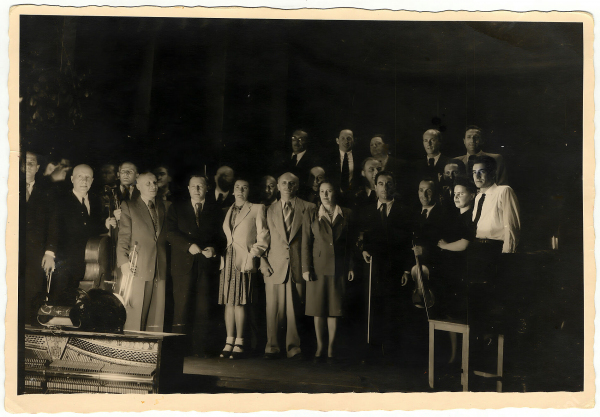Latest News
From the Archives: Remembering Landsberg, Germany Concert
Posted January 14, 2025
Remembering Landsberg, Germany Concert
By Michael Bernstein
(as printed in the 2018/2019 Fall/Winter issue of Prelude, Fugue & Riffs)

29-year-old Leonard Bernstein (far right) with members of the Displaced Person Camp Orchestra, May 10, 1948. Courtesy of Sonia Beker
![]()
This past spring, a unique concert marked the 70th anniversary of a historic performance Leonard Bernstein led with Jewish survivors of World War II, who in 1948 were living in Displaced Persons camps awaiting the resolution of their collective fates. Survivor Harry Bialor recalled: “It was hot. No air-conditioning. Bernstein said, ‘We’ll sweat together’ in Yiddish. He played marvelously on a lousy piano.”
In 1948, when 29-year-old American conductor Leonard Bernstein arrived in Munich, Germany, he was still practically unknown in Europe. Lenny was devastated to discover a city still so utterly “shell-shocked,” three years (almost to the day) after Germany’s surrender. Carlos Moseley, who would later manage the New York Philharmonic, was then working for the Military Government of the American occupational force. Moseley arranged for Lenny to conduct the Bavarian State Opera Orchestra, whose Jewish members had been purged, deported or executed by the Nazis since 1933.
The orchestra musicians were in quite bad shape and there were still diehard Nazis among them. On May 8th, Lenny wrote to his mentor, Serge Koussevitzky: “Munich is a mess. Nazism everywhere, a sick economy, people working for a few cigarettes a day, Jews rotting in camps, miserable as all get-out, and the city in ruins.” After an oboist fainted during a rehearsal, the orchestra went on strike to demand more food rations (although one wonders if the strike had more to do with their being asked to play under the baton of an American Jew).
While Lenny waited for the strike to be settled, he asked around if there were any musicians among the Jewish holocaust survivors still in Germany. He was told of an orchestra made up of of ex-concentration camp prisoners, who were then awaiting emigration and being held in the Displaced Persons’ camps surrounding Munich.
Lenny made arrangements to hold a concert with The Represenzentanc Orkester fun der Szeerit Hapleitah (the orchestra representing the surviving remainder). He wrote to his secretary, Helen Coates, on May 5th: “There has been much trouble and fuss over this, but I insisted. I may have to hire the orchestra myself, but it’s worth it.”
Meanwhile, rehearsals for the Munich concert were back on. On the eve of the May 9th concert, Lenny wrote to Koussevitzky: “I had expected great hostility from the orchestra... but they seem to love me, and play with great Lust. One violinist told me this morning at the rehearsal that in all Germany there were maybe two conductors who could play Schumann as well as I, and they’re both over 80 years old. That was my biggest compliment of all time!”
Three days later, he wrote to Coates: “The Munich concert was the greatest success to date. Especially, because I had three obstacles to overcome—youth, Americanism & Jewishness. And what a riotous success! There’s nothing more satisfying than an opera house full of Germans screaming with excitement... It means so much for the American military government, since music is the Germans’ last stand in their ‘master-race’ claim, and for the f irst time it’s been exploded in Munich.”
The concert one night later with the Displaced Persons Orchestra might not have been as triumphal from a musical standpoint (the instruments were nearly as worn down as the players), but it left Lenny, the musicians and the listeners emotionally overjoyed and inspired. “I was received by parades of kids with f lowers, and the greatest honors,” Lenny wrote to Coates. “I conducted... Freischütz of all things and cried my heart out.” The program closed with Lenny playing Gershwin’s Rhapsody in Blue, conducting from the piano.
This year’s anniversary concert, produced by journalist Karla Schönebeck and artist Wolfgang Hauck, featured some of the same works performed at the historic 1948 concert, this time performed by a chamber orchestra made up of members of the Bavarian Philharmonic, conducted by Mark Mast. And 26-yearold piano-phenom Guy Mintus brought down the house at the Stadttheater Landsberg with his improvisational interpretation of Rhapsody in Blue.
For Lenny himself, the 1948 concerts in Munich and Landsberg would be unforgettable experiences. The postscript of his letter to Helen Coates instructs: “You will receive by mail a package containing a real concentration camp costume which they gave to me. Be particularly careful of it.” That f irst encounter with Nazism’s fallout in Bavaria certainly paved the way for Lenny’s subsequent career triumphs in Vienna, Salzburg, Schleswig-Holstein, and Berlin. And the concerts surely reinforced his belief in humanity’s capacity for reconciliation and renewal.
--
In 2001, Michael Bernstein, the Maestro’s nephew, moved to Vienna from New York City, where he had been the Administrator for the New York Foundation for the Arts. He is now a freelance writer, editor, and translator.